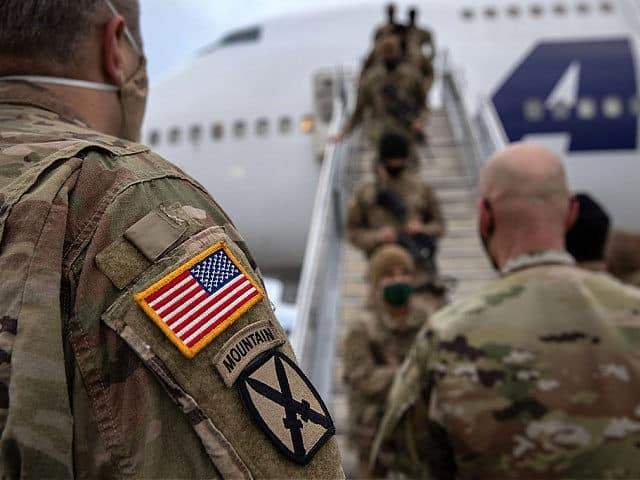State: Our Goal to End Afghan War Same as Trump Administration

U.S. President Joe Biden is pursuing the same goal as his predecessor to accelerate the end of America’s longest war in Afghanistan between U.S.-backed local forces and Taliban narco-jihadis, a State Department spokesperson indicated on Monday.
The Biden administration has reportedly not ruled pulling out all U.S. troops from Afghanistan by May 1st.
President Biden inherited a February 2020 peace pact between the Trump administration and the Taliban that commits the U.S. to pull out its troops by May if the jihadi group keeps its promises under the deal. The deal requires the Taliban to cease attacking American forces and cut ties with foreign terrorist organizations like al-Qaeda.
Taking a page from former President Donald Trump’s team, the current administration is working with the Taliban, the Afghan government, and regional countries such as Pakistan towards a political settlement and comprehensive ceasefire in Afghanistan, Ned Price, a State Department spokesman, declared Monday, adding:
We are working with the international community, including in Pakistan, including the actors in [the Qatari capital of] Doha [that houses the Taliban’s political office] … to encourage progress on the Afghan peace process, including progress towards a political settlement and comprehensive cease-fire.This was in many ways the goal of the last administration. This is the goal that we continue to work towards today.
Regional allies and the U.S. are “considering a number of different ideas to, again, accelerate that [peace] process,” Price added later.
His comments came in response to a reporter’s question about news outlets publishing a letter from Secretary of State Antony Blinken to Afghan President Ashraf Ghani that outlined America’s plan to accelerate the end to the war that has been raging since October 2001.
Responding to a question about the letter, Price refused to confirm or deny the existence of the letter.
Nevertheless, Voice of America (VOA), an independent arm of the U.S. government, and Afghan news outlets obtained a copy of the letter.
“The United States has not ruled out any option. We are considering the full withdrawal of our forces by May 1st, as we consider other options,” the letter reportedly declared.
Blinken also warned the Afghan president that Afghanistan might have to prepare for “a Taliban onslaught on its own” if Ghani fails to consider measures on accelerating the peace process immediately, VOA added. Blinken also reportedly proposed the formation of a “transitional Peace Government of Afghanistan” that would eventually transfer power to a permanent administration “following the adoption of a new constitution and national elections.”
Afghan President Ghani has rejected the idea of putting together a new government because it may exclude him.
On Monday, Price did not mention pulling all U.S. forces from Afghanistan by May 1.
Since taking office, the Biden administration has repeatedly said it is reviewing if the jihadi group has fulfilled its promises under the Trump-Taliban deal. The peace-seeking effort in Afghanistan picked up steam under former President Trump, who launched a record airstrike campaign to pressure the Taliban to join the negotiation table.
Amb. Zalmay Khalilzad, the U.S. Special Representative for Afghanistan Reconciliation, is a Trump holdover who is still working on the peace process on behalf of the Biden administration. Under Trump, Khalilzad succeeded where the Obama-Biden administration failed — reaching a historic peace agreement between America and the Taliban in February 2020. The ambassador and Biden’s State Department have been consulting with regional allies to support the Afghan peace process.
Price stressed that the peace “process at its core must be Afghan-led and Afghan-owned.”
“It is ultimately the right and responsibility of Afghans to determine their political future,” he added.
The Trump-Taliban pact set a timetable for the withdrawal of U.S. troops. President Trump reduced the number to a historic low of 2,500 right before leaving office to convince the Taliban to keep its commitments.
It also laid out the process for talks between the Taliban and the U.S.-backed Afghan government, which remain at war.
Under the Trump deal, however, the total withdrawal of U.S. troops is not contingent upon intra-Afghan negotiations’ success.
Pulling out U.S. troops is dependent on the Taliban’s commitment to fighting its Islamic State (ISIS) rivals, severing its ties to al-Qaeda, and ensuring attacks against America and its allies do not again originate from Afghanistan.
The Taliban, which calls itself the Islamic Emirate of Afghanistan (IEA), does not recognize the legitimate government of Afghanistan and aspires to establish a sharia-compliant government as many other Muslim nations have done. The Republic of Afghanistan as it stands is already an Islamic government.
Photo: John Moore/Getty Images
Link: State to Afghanistan: Accelerate Peace or Face May 1 U.S. Pullout (breitbart.com)











